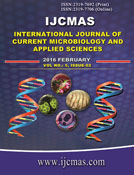


 National Academy of Agricultural Sciences (NAAS)
National Academy of Agricultural Sciences (NAAS)

|
PRINT ISSN : 2319-7692
Online ISSN : 2319-7706 Issues : 12 per year Publisher : Excellent Publishers Email : editorijcmas@gmail.com / submit@ijcmas.com Editor-in-chief: Dr.M.Prakash Index Copernicus ICV 2018: 95.39 NAAS RATING 2020: 5.38 |
Dengue fever is the most prevalent mosquito-borne viral disease worldwide and it causes regular epidemic in India. It is believed that climate is an important factor for dengue transmission and there is much concern as to whether climate change would spread the disease to areas currently unaffected. This study was carried out to report the seroprevalence of dengue virus infection and effect of climate on incidence of dengue in and around Bengaluru city, Karnataka, India. The laboratory records of clinically suspected dengue patients from January to December 2014 and January to November 2015 were analyzed for the anti-dengue immunoglobulin M (IgM) antibodies, tested by dengue monoclonal antibody (IgM) capture enzyme-linked immunosorbent assay (MAC ELISA). A total of 4835 serum samples were tested, of which 1756 were positive. The majority were males (70%) and in the age group of 16–30 years. The incidence of dengue started to increase in June and peaked in August & September and slowly tapered by December. Dengue cases were higher during rainy season and in humid temperature. This observation is useful for planning special preventive strategies during this time. An effective control and preventive programmes depend upon improved surveillance data and action taken.
 |
 |
 |
 |
 |